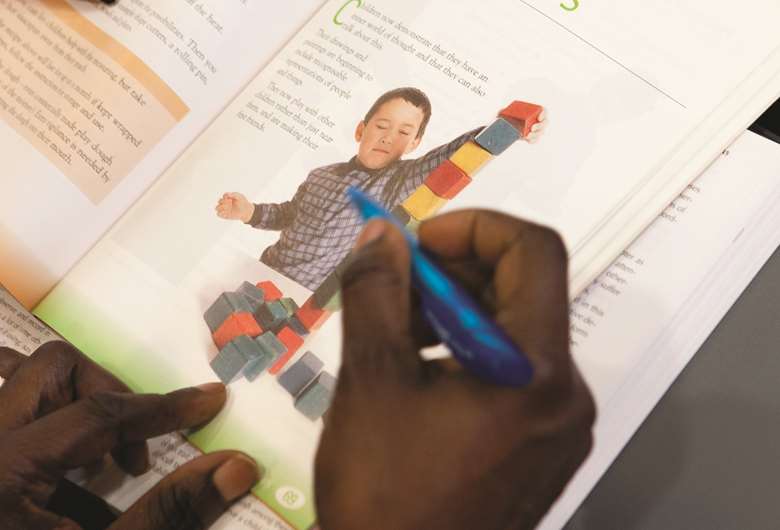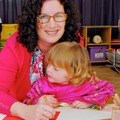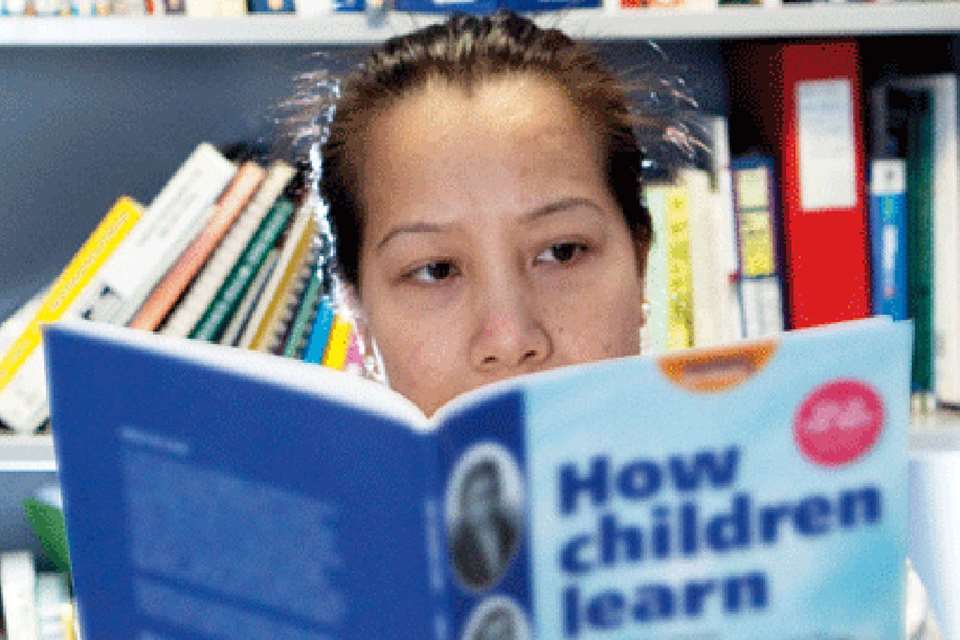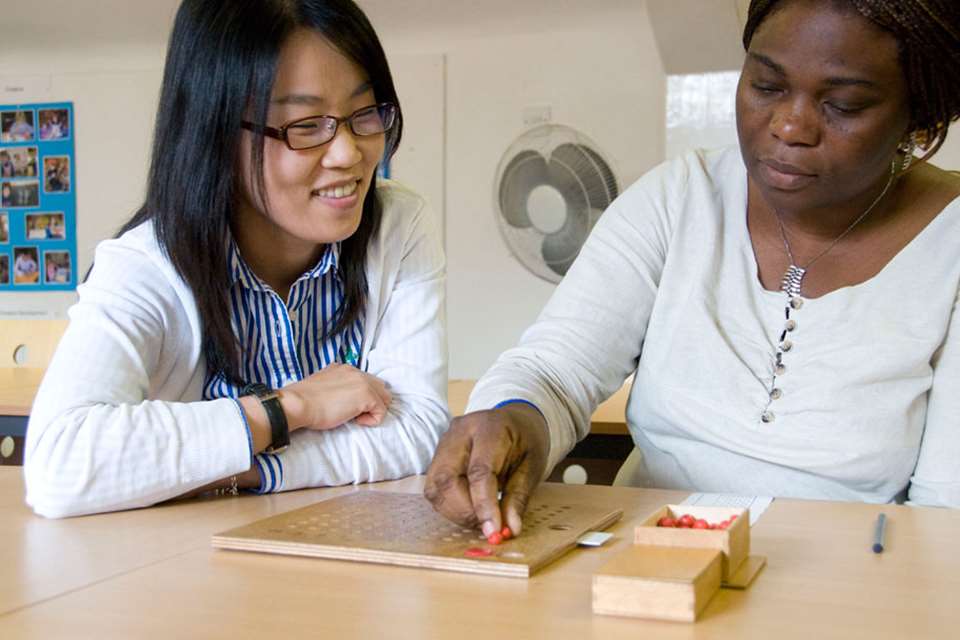Guide to EYE: Part 1 - On course for clear improvement?
Gabriella Jozwiak
Monday, June 2, 2014
In the first of a nine-part series, Gabriella Jozwiak introduces the six criteria for the new level 3 Early Years Educator qualification, and reports on their reception from the sector.

The Government announced the launch of the new Early Years Educator (EYE) qualification for workers below graduate level in last year's 'More Great Childcare' report. It is the benchmark for minimum qualifications requirements for those working in childcare - only courses approved as EYE qualifications will be deemed full and relevant at level 3.
EYE students will be expected to meet the rigorous criteria set out by the National College for Teaching and Leadership. They also need to have a minimum grade C in GCSE English and maths. Colleges will begin delivering the new level 3 qualification from September this year.
The EYE has six criteria. Published in July 2013, they aim to reflect recommendations made in Cathy Nutbrown's review of early education and childcare qualifications.
THE CRITERIA
The first criterion is to 'support and promote children's early education and development'. It specifies that EYE students should understand children's expected patterns of development from birth to age five, and further development from five to seven. It recognises the various types of development, including cognitive, speech, language and communication, and emphasises the significance of attachment. Further, students must understand systematic synthetic phonics in teaching reading.
The president of charity Early Education, Helen Moylett, says the focus on development is more rigorous than current level 3 expectations, but regrets the omission of play from the requirements. 'Given that we have a statutory duty to report on how children learn through playing and exploring, it's a bit strange that's not in there,' she says. 'It's odd that it mentions phonics but not play.'
The second criterion is to 'plan and provide effective care, teaching and learning that enables children to progress and prepares them for school'. It notes a requirement for students to learn how to plan and lead 'purposeful play', but Ms Moylett believes that this is too vague. 'There's nothing in there to help people understand what that means - what is purposeful play?' she says.
Mama Bear's Day Nursery and Pre-school regional general manager Kerry Sturmey thinks the criterion links effectively to current legislation and the Early Years Foundation Stage (EYFS). She highlights that as well as the criterion's emphasis on school readiness, it stipulates the need for students to support children through other transitions and significant events, such as family breakdown and moving between settings.
'It is important for practitioners to really grasp an understanding of this as children make many transitions, not only on to school, but between rooms in settings and also often attend more than one setting,' she says. 'Practitioners need to understand this process and their role in supporting not only the children but also the families they service to ensure each transition is managed effectively.'
Ms Sturmey suggests the third criterion, to 'make accurate and productive use of assessment', is a 'hard area to cover while gaining any qualification, as each setting has its own systems and processes for actual planning and assessment'. Students must 'carry out and record observational assessment accurately' and 'discuss children's progress and plan next stages in their learning with the key person, colleagues, parents and carers'.
But Ms Sturmey praises the fourth requirement to 'develop effective and informed practice'. She says, 'I especially like the emphasis here on continuing personal development and reflective practice - this is something I ingrain into all of my staff and it becomes part of the normal routine within the nurseries.
'You need to reflect on your practice, that of the setting and processes in place, and look to where changes can be made and identify priorities for improvement to maintain and develop the quality of provision.'
Requirement five covers safeguarding and promoting children's health, safety and welfare. It includes knowing the legal requirements around health and safety, safeguarding and the confidentiality of information, and how to carry out physical care routines suitable for children of different ages.
The final criterion states that students should learn how to work in partnership with key people, colleagues, parents, carers and other professionals. It notes that EYE requires practitioners to encourage parents and carers to take an active role in their child's play, learning and development.
Ms Sturmey says these last two criteria, along with all the specifications, are strong because they link directly to practitioners' needs to meet the EYFS. She adds, 'Of course it is vital that candidates have high-quality work placements and that they are empowered to use the theory and skills learnt in the classroom and adapt them to working practices within the setting.'
GENERALLY POSITIVE
Solihull College head of school for early years Helen Perkins says that, overall, the EYE standard reflects Professor Nutbrown's recommendations. '(Her) review called for qualifications to bring child development, play, theory, pedagogy, observation, assessment and planning to the fore,' she says. 'Practitioners must understand the research and theory that underpin their day-to-day work and decisions as, without such theoretical knowledge, what they do can lack rigour and rationale.'
Ms Perkins backs the requirement for nursery staff to have an English and maths GCSE at grade C or above. 'We hear much from employers in every sector about poor literacy and numeracy,' she says. However, she criticises the Government's decision to allow 16- to 19-year-olds without those grades to work towards them and study level 3 simultaneously, while adults must have them in advance. 'Adults are less likely to have GCSEs in English and maths,' she says. 'It's really unfair and totally discriminatory.'
Nonetheless, Ms Perkins is confident the EYE standard will be positive for the sector. 'There is nothing wrong with this qualification,' she says. 'It's sound, solid and robust. It will hopefully mean we have some respect back for what an early years educator can do.'
Part 2, published on 2 June, will examine how the awarding bodies designed the qualifications
THE EMPLOYER'S VIEW: CHERYL HADLAND
'The EYE criteria are reasonable but, as an employer, I don't believe the qualification alone will prepare students for work.
'Employers need staff who can make observations, assessments, plan, set up activities, care for and play with the children. It's a practical job and we are increasingly using technology to reduce the paperwork in order to spend more time with the children. The EYE does the opposite, with an increased loading on theory and academic rigour. Of course we need staff to know why they do what they do, but it has gone too far.
 'When somebody studies at college, they might want to go directly to university, and the college must prepare them for that. But if they want to go straight to work in a nursery, they need to be able to be responsible for a number of key children, communicate with families and contribute to the team. There is not enough about that in the EYE qualification.
'When somebody studies at college, they might want to go directly to university, and the college must prepare them for that. But if they want to go straight to work in a nursery, they need to be able to be responsible for a number of key children, communicate with families and contribute to the team. There is not enough about that in the EYE qualification.
'Doing a placement is so different from being employed. Students are not part of the staff:children ratio, don't have key children, and don't go to staff meetings. The EYE qualification doesn't cover HR skills, so I could not let a level 3 graduate come straight into 'supervising' in a day nursery. That requires leadership, mentoring and coaching skills.
'If someone applied to work at Tops with a college EYE qualification, I could employ them at the level of nursery assistant. It would probably take three months before I could use them as a key person and a year or more before they could lead another adult.
'I don't agree with the requirement for level 3 staff to have GCSE maths and English at grade C. Some of the maths will never be used in a day nursery. English GCSE doesn't test listening or speaking, which are crucial for communicating with small children, parents and colleagues. The Government seems to be using the GCSE as an intelligence and general education test. There are better ways to assess these for the workplace.
'The effort to professionalise day nurseries is great, but the input to the EYE has been dominated by academics. It will leave employers still having to train post-EYE in order to produce effective employees.'
Cheryl Hadland, managing director, Hadland Care Group (Tops Day Nurseries).






